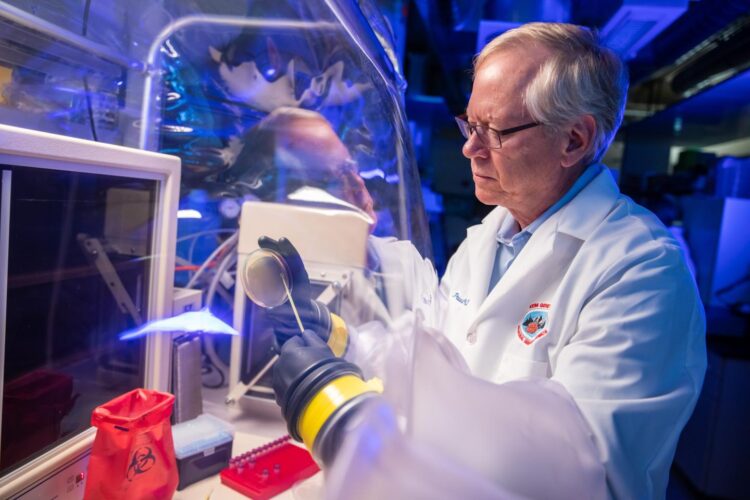Team will use genomic sequencing to track new coronavirus, provide critical data for global biomedical researchers and give Arizona an edge in responding to the pandemic

Credit: Northern Arizona University
The Translational Genomics Research Institute (TGen), an affiliate of City of Hope, The Pathogen and Microbiome Institute at Northern Arizona University and the Ecology and Evolutionary Biology Department at the University of Arizona have formed a union dedicated to tracking the COVID-19 coronavirus, it was announced today.
Harnessing the power of state-of-the-art technology and “big data” analysis, researchers at the newly formed Arizona COVID-19 Genomics Union (ACGU) seek to better understand how this virus may be evolving, how it is transmitted and how it is moving through the general population. This molecular epidemiological approach combines traditional epidemiology methods with evolutionary modeling based on high-resolution analysis of the virus’ genome.
ACGU scientists will sequence samples from COVID-19 patients to analyze the virus’ genetic codes, track its different strains, show where each sample originates from, where it may have been transmitted and — possibly — reveal details that could provide critical information for diagnostics, anti-viral drug targets and vaccine development.
“Only by using genomic sequencing and advanced analyses can we begin to fully understand this disease at the molecular level, looking for keys to unlock its mysteries,” said David Engelthaler, Co-Director and Associate Professor of TGen’s Pathogen and Microbiome Division, the infectious disease branch in Flagstaff known as TGen North. “We have the ability to sequence the genome of every strain from every patient — that’s what we are working toward.”
Engelthaler is Arizona’s former State Epidemiologist and State Biodefense Coordinator. He was formerly with the Centers for Disease Control (CDC), and has led investigations of local, national and international disease outbreaks for over 25 years, starting with Arizona’s 1993-94 hantavirus outbreak. He will coordinate the new ACGU’s genomic sequencing of the SARS-CoV-2 virus, which causes the COVID-19 disease.
The Union’s other co-founders are two of Arizona’s leading infectious-disease scientists: Paul Keim of Northern Arizona University and Michael Worobey of the University of Arizona
Keim is a world expert in pathogens such as plague and anthrax. He worked with the FBI to crack the “anthrax letters” case in the wake of 9/11. At NAU, he is a Regents’ Professor of Biology, holds the Cowden Endowed Chair in Microbiology and is Executive Director of The Pathogen and Microbiome Institute (PMI). He is a Distinguished Professor at TGen, Co-Director of TGen North and will serve as Director of the ACGU.
“Genome sequences are ideal for distributed scientific research efforts and the Arizona Union will rely heavily on national and global studies to track the disease. Nevertheless, it is critical that regional experts engage in this process to maximize the benefits for Arizona citizens,” said Keim.
Worobey is the head of University of Arizona’s Ecology and Evolutionary Biology Department, and is world-renowned for his work on viral pandemics. Using genomic epidemiology, he has definitively tracked the origins and worldwide spread of HIV and also determined why the 1918 “Spanish influenza” pandemic killed millions of young adults.
“Molecular analysis of viruses provides crucial clues about how pandemics begin and how to fight them,” said Worobey. “We will be capitalizing upon Arizona’s wealth of talent and infrastructure in this endeavor.”
The Arizona COVID-19 Genomics Union is similar to other groups across the globe that are working to gain a foothold in fighting this new coronavirus. Rapid sharing of data and analysis has been, and continues to be, critical to scientific, medical and public health understanding of the pandemic. Ironically, the first U.S. epicenter of COVID-19, Seattle, is also home for NextStrain, the internet home for genome tracking of this and other pathogens.
The consortium of Arizona scientists hope that their regional sequencing will give Arizona healthcare providers and public policy makers an edge in responding to this pandemic.
Like NextStrain, ACGU will make its findings public and openly available to epidemiologists and virologists worldwide.
###
Media Contact
Diane Rechel
[email protected]





